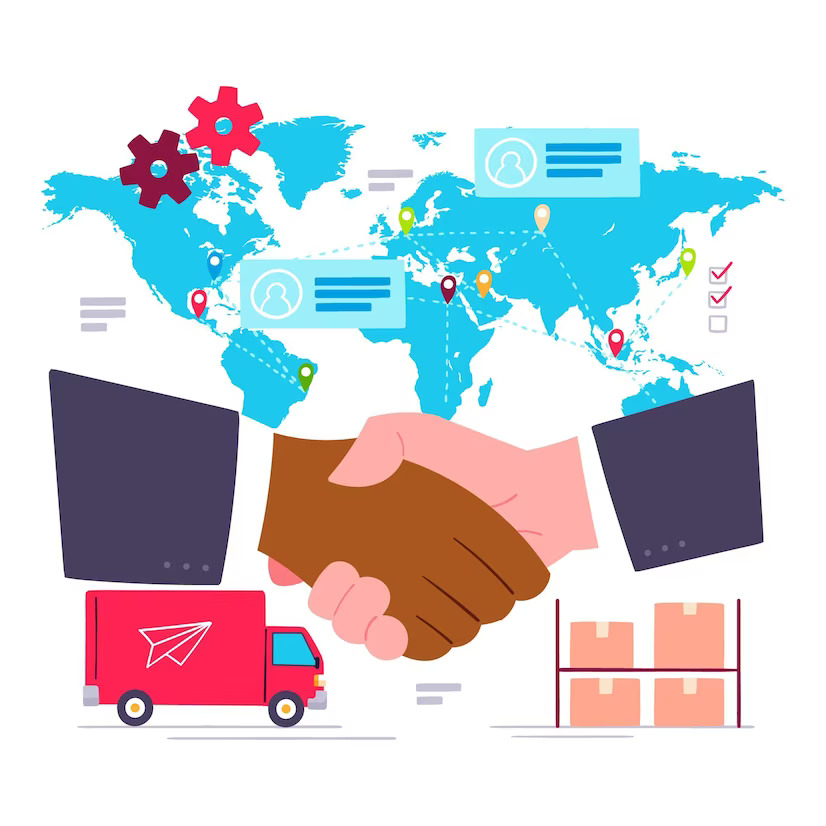Successful operations hinge significantly on strong relationships with suppliers. Supplier Relationship Management (SRM) is a critical component in forging these ties. However, SRM isn’t always a straightforward journey. This guide will walk you through the SRM concept, its benefits, and how your business can surmount common challenges.
Grasping SRM’s Essence

Supplier Relationship Management, or SRM, is a systematic approach to assess, select, manage, and develop collaborative relationships with suppliers. It is the nexus where business needs and supplier capabilities intersect, aiming to create a symbiotic relationship that delivers value beyond mere transactional interactions.
SRM holds immense significance in business operations. When executed effectively, it bolsters efficiency, streamlines procurement, and aids in mitigating supply chain disruptions. Moreover, it paves the way for businesses to explore new growth opportunities, leveraging supplier capabilities and innovation to drive competitiveness and market expansion.
Highlighting Supplier Relationships
In this section, we illuminate the invaluable role of SRM in nurturing prosperous supplier relationships. We’ll highlight how these partnerships, built on SRM principles, enhance business efficiency and elevate quality control.
Role of SRM in Relationships
A robust SRM strategy goes beyond simple transactional relationships with suppliers. It facilitates the building of strategic partnerships based on mutual understanding, trust, and shared objectives. These partnerships can yield an array of benefits, including enhanced service, access to innovation, and improved market responsiveness.
Enhancing Efficiency and Quality
SRM has a profound influence on supply chain efficiency. A refined understanding of supplier capabilities, coupled with effective communication, can drastically reduce lead times, mitigate risks, and ensure a more responsive supply chain. Furthermore, strong relationships pave the way for improved quality control, as committed suppliers are more likely to adhere to quality standards and rectify issues promptly.
As businesses expand and face increasing customer support demands, specialized outsourcing companies offer a cost-effective solution, ensuring better client care and success in an ever-responsive supply chain.
Navigating SRM Challenges

Now, let’s dive into the intricate challenges often encountered in SRM. From communication barriers to risk management, we’ll explore these difficulties and present effective strategies to navigate through them.
Overcoming Communication Barriers
Communication is crucial in any relationship, including those with suppliers. Ineffective communication can result in misunderstandings, unmet expectations, and in the worst-case scenario, severed ties. Businesses can surmount this challenge by establishing clear, efficient communication channels, ensuring all parties are on the same page regarding expectations, performance metrics, and feedback.
Tackling Compliance and Risk
Managing compliance and risk is another significant hurdle. Supplier compliance with regulatory standards is paramount, as non-compliance can lead to reputational damage, penalties, or legal action. On the other hand, risk management pertains to foreseeing and mitigating potential disruptions in the supply chain. Businesses can overcome these challenges by conducting thorough supplier audits, developing contingency plans, and employing effective supplier risk management software for better oversight.
Addressing Contractual Issues
Contracts are a foundational element of supplier relationships, dictating terms, conditions, and performance expectations. However, negotiations can often become a contentious point, especially when it comes to price. Building a foundation of trust, employing fair negotiation tactics, and striving for a win-win scenario can help businesses navigate this hurdle successfully.
Cultivating Trust and Cultural Synergy
The last challenge, but certainly not least, is managing cultural differences and building trust. In today’s global marketplace, businesses often work with suppliers from different cultural backgrounds. Understanding these differences, respecting them, and finding common ground is crucial for successful SRM, visit Certa to know more. Equally important is building trust, which requires consistency, transparency, and fairness in all interactions.
Reaping SRM’s Benefits

After successfully overcoming SRM challenges, businesses can reap a myriad of benefits. In this section, we’ll discuss how these benefits contribute to improving supplier performance, managing risk efficiently, and unlocking innovation potential.
- Elevating Supplier Performance – Overcoming SRM challenges brings a host of benefits, the first being improved supplier performance. When suppliers perceive their customers as partners rather than just buyers, they are more likely to go the extra mile in terms of service, responsiveness, and quality, leading to superior performance overall.
- Efficient Risk Management – Next, effective SRM aids in risk management. With a robust strategy in place, businesses can anticipate potential risks, devise adequate responses, and prevent disruptions in the supply chain. A reliable supplier risk management software can be instrumental in this regard, providing real-time insights, predictive analytics, and actionable recommendations for risk mitigation.
- Unlocking Innovation – Another exciting advantage is the potential to foster innovation. Collaborative supplier relationships open avenues for sharing ideas, resources, and expertise, which can lead to the development of innovative products, services, or processes. This collaborative innovation can provide businesses with a significant competitive edge in their respective markets.
Improving SRM Practices
The journey doesn’t end with understanding SRM and its challenges. This section serves as a guide to enhancing your SRM practices, with actionable insights on improving communication, fostering trust, cultivating a collaborative culture, and implementing effective performance evaluations.
- Streamlining Communication – The first step towards enhancing SRM is to optimize communication. Developing open, honest, and clear communication channels is crucial. Regular check-ins, performance reviews, and constructive feedback can help maintain a healthy supplier relationship. When combined with the right supplier relationship management software, businesses can achieve a seamless flow of information, facilitating better decision-making.
- Establishing Trust through Fairness – Building trust is a vital part of successful SRM. This process involves fair negotiations, prompt payments, respect for contractual terms, and effective conflict resolution. Businesses that invest time and effort in building trust with their suppliers often enjoy longer, more beneficial relationships.
- Cultivating a Collaborative Culture – Fostering a culture of collaboration is another actionable insight. Treating suppliers as partners, involving them in strategic decisions, and working towards shared goals can unlock immense value for both parties. Collaboration can also be enhanced by leveraging a sophisticated supplier management tool that facilitates information sharing, joint planning, and shared metrics.
- Implementing Regular Performance Evaluation – Lastly, it’s essential to set up regular performance evaluations and feedback mechanisms. These evaluations should be comprehensive, encompassing factors like quality, delivery, service, innovation, and overall value. Feedback should be constructive and objective, focusing on continual improvement rather than criticism.
Strong SRM practices are more than a business necessity—they are a strategic advantage. By understanding the core concepts of SRM, recognizing its benefits, and surmounting common challenges, businesses can cultivate rewarding supplier relationships that elevate operational efficiency and drive growth. Let this guide inspire you to explore and enhance your SRM practices and experience the myriad benefits it can bring to your business operations.




